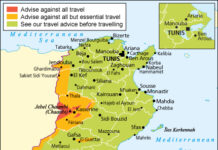Serbia’s police citing a risk of clashes between gay rights activists and far-right opponents during the pan-European LGBTQ events in Belgrade. Photo / Darko Vojinovic, AP
Serbia’s police on Tuesday banned a Pride march planned amid pan-European LGBTQ events being held this week in Belgrade, citing a risk of clashes with far-right anti-gay activists. Organisers vowed to appeal the ban.
Pro-Serbian Orthodox Church conservative groups, who have been marching unhindered for weeks on the Serbian capital’s streets to protest the LGBTQ events, had scheduled a new demonstration for Sept. 17 — the day of the Pride parade. Police also banned that anti-gay protest.
“After the security assessment, it was determined that there is a high risk the safety of participants in both (marches) on the announced routes will be endangered, as well as the safety of other citizens,” police said in a statement.
Serbia’s populist president had earlier warned the gay Pride march would be banned.
Organisers of EuroPride, the largest annual Pride event in Europe — which includes a week of festivities — said they hoped their legal appeal against the ban will be accepted and that they would hold the festivities as planned.
“Belgrade Pride will use all available means to overturn this decision,” their statement said.
After the ban was announced, gay activists booed and jeered Serbian Prime Minister Ana Brnabic, who is openly lesbian but has been accused by the Serbian gay community of doing nothing to improve their status. She attended a human rights conference that was a part of the week-long LGBTQ events.
/cloudfront-ap-southeast-2.images.arcpublishing.com/nzme/F7E3STONBB6LH7CV43NILX5CRE.jpg)
The Council of Europe’s human rights commissioner, Dunja Mijatovic, said Serbian authorities should withdraw the ban on the march and protect participants. The CoE is Europe’s top human rights body.
“It is highly regrettable that the Serbian authorities have decided to ban the EuroPride march scheduled for 17 September,” Mijatovic said in a statement. “Weeks of uncertainty concerning the holding of this march have sent a wrong message to the public and made space for hateful rhetoric and more threats against LGBTI people, including from religious leaders”
Members of the European Pride Organisers Association chose Serbia’s capital three years ago to host the annual event, hoping it would represent a major breakthrough for a Slavic country that is traditionally conservative and strongly influenced by the Orthodox Church.
– Associated Press







